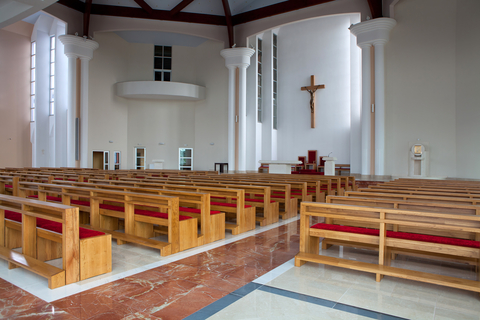Qualifying for a Church Loan
The members of a church will likely have many questions when they first initiate the loan process. How much does the church need to borrow? Which potential lenders actually make loans to churches? What documentation will be required during the loan process? What will be the interest rate? How much will be the monthly payments? Yet, before the answers to any of these questions can be of any real significance, the first thing the church members will want to know is, can we qualify for the loan?
Many church members have had the personal experience of qualifying for a loan on their own home and they may anticipate the process will be much the same for their church. While there are some similarities, there are also several areas which differ as well.
Home Loans vs Church Loans
The vast majority of home loans are made to individuals, often a husband and wife as joint tenants, for example. Church property, on the other hand, is normally in the name of the church and that church is usually set up as a corporation. While there is nothing wrong with a
corporation having title to a property, is does greatly reduce the number of potential lenders on that property. The reason for this is, many loans to homeowners are later sold off on the secondary market and that secondary market often doesn’t cater to properties held in the name of a corporation.

In addition to a church property being vested in the name of a corporation, another consideration is the nature of the property itself. Home loans, as a rule, are made on owner occupied single family residences as well as on 1 to 4 unit properties. In each case these properties are classified as “residential”. Church property, on the other hand, is almost always classified as “commercial” property”. Oftentimes the only experience many church members may have is when they financed their own personal home, they may not take this difference into consideration. While a single family residence and a church property are both real estate, it can be similar to comparing apples to oranges. There are many potential lenders on residential property, but there are relatively few who loan on commercial property and even fewer yet when it comes to churches. Church property can often be considered “single use” (used only as a church), making it less desirable to potential lenders.
Potential Lenders
Now that we’ve discussed the two primary differences between church properties and residential properties, lets now discuss the potential lenders. Most institutional lenders, such as banks and credit unions, are considered credit lenders. These credit lenders tend to focus primarily on credit reports, income, income-to-debt ratios, monthly household expenses, job security of the applicate(s) and what personal assets the borrower(s) may have at their disposal. The potential borrower(s) may have a lovely property, with plenty of equity, yet be unable to quality for a loan because of some old credit item or an income or asset issue.
In addition, institutional lenders normally require a great deal of paperwork from the borrower such as tax returns, W-2s, verification of deposits, verification of income, etc. as part of the qualifying process.

The same can hold true for churches as well. In addition to the paperwork required by institutional lenders, some members of the church may be asked to provide personal guarantees on the loan making themselves personally liable should the church default on the loan at some future date. These lenders may also ask for a written history on the church, a resume on the pastor, credit reports on the signors and a copy of the church’s mission statement.n.
Assuming the church provides the institutional lender all the required paperwork, personal guarantees, etc., the time to process the loan request can often take several months. At the end of the process there is no assurance the church will be granted the loa
How is a Loan from BDM Different?
So, how does a church qualify for a loan through BDM Mortgage Services (BDM) and how does BDM differ from the institutional lenders just discussed?
First of all, the loans arranged by BDM for churches are funded by private party lenders. These private party lenders are usually individual investors who use both personal funds as well as money in their IRAs or perhaps in a family trust. Other private party lenders include profit sharing plans and/or pension plans. Using private party lenders gives BDM a great deal more flexibility than an institutional lender who must meet many state and federal regulations that do not apply to private party lenders.
The second, and likely the most important, difference between BDM and institutional lenders is how a church qualifies for a possible loan. Remember institutional lenders were considered”credit lenders”. Well, the loans arranged by BDM are based primarily on the equity in the church’s real estate. Therefore, the private party lenders BDM uses are considered “equity lenders”. This is where BDM distinguishes itself from the institutional lenders.
What Documents Do You Need?
It is very unusual for a church to have the necessary equity in its property and BDM not be able to arrange the loan requested. While BDM does consider the church’s income (in the form of monthly bank statements) it’s a secondary consideration. An appraisal of the property is therefore the most important item in the loan process.

Once the church has provided BDM with the “Information Required to Process a Loan Request“, a title search on the church’s property has been done and the appraisal completed, the church will know if it qualifies. All this can be done in approximately 10 business days and often much sooner.
Regarding the “Information Required to Process a Loan Request”, you will see it mostly involves photocopying material the church likely has on hand. The Articles of Incorporation, the church’s By-Laws and the evidence of fire Insurance can all be photocopied. The only financial information BDM requires are photocopies of the church’s last 12 months bank statemehe processing on the church’s end is minimal and easy to compile. At BDM there is no loan application form that needs to be filled out by the church. We do not run credit reports on any of the church members.
So, in closing, the primary consideration the church needs to take into account when it comes to BDM Mortgage Services to apply for a loan is, does it have sufficient equity in its real estate.
For more information regarding this qualifying process, or if you or your church have any questions, simply give us a call at (800) 439-9551.

